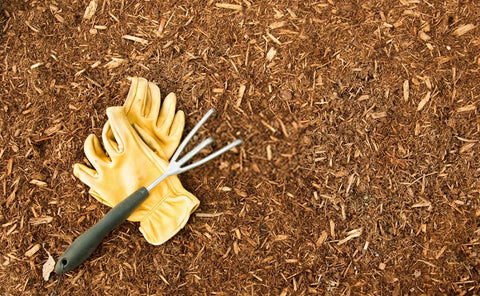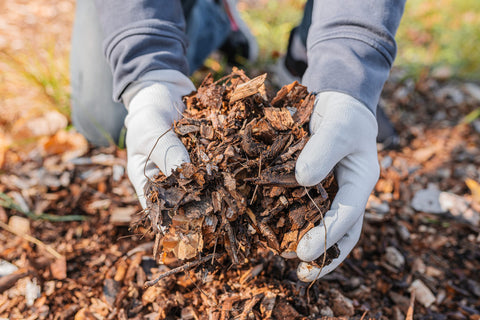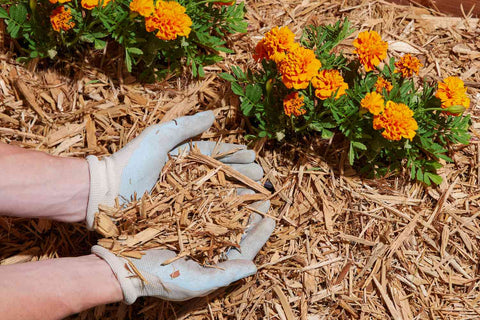When it comes to weed prevention, there are many myths and misconceptions. One common belief is that you need to use thick mulch to prevent weed growth. Is this true? Or can you use a thinner layer of mulch and still successfully keep weeds at bay? In this article, we'll take a close look at the relationship between mulch and weeds and help you answer the question: "Can thick mulch prevent weeds?"
Can Thick Mulch Prevent Weeds?
In short, no, thick mulch doesn't necessarily prevent weeds. However, mulch can be an effective tool in combating weeds, especially when combined with other weed prevention strategies.

Many gardeners prefer using mulch to help prevent weeds from taking over their flower beds. Mulch is a material spread over the soil surface, such as bark chips, compost, or straw. It acts as a barrier between the soil and the air, helping retain moisture and prevent weed seeds from germinating.
While a thick layer of mulch indeed suffocates young weed seedlings, it's essential to remember that mulch decomposes over time. As it becomes thinner, its weed-suppressing effectiveness diminishes. Additionally, thick mulch can sometimes create an ideal environment for weed seeds to germinate by trapping heat and moisture near the soil surface.
What is Mulch?
Mulch is any material laid or spread on the soil surface to protect the soil from erosion, retain moisture, or provide nutrients. Common mulches include leaves, straw, wood chips, and bark. Gardeners often use mulch to enhance the aesthetics of their plants and keep the garden looking tidy. Besides aesthetics, mulch helps suppress weed growth, reduce evaporation, and shield plants from the impact of extreme temperatures.

Mulch is typically applied in layers of two to four inches deep. It should be replenished annually or maintained at a sufficient depth as needed. There are various types of mulch to choose from, so selecting the right one for your garden is crucial. For example, bark mulch is beneficial for preventing weed growth, while leaf mulch is an ideal choice for adding nutrients to the soil.
Thick Mulch vs. Thin Mulch: What's the Difference?
The difference between thick mulch and thin mulch lies in both the coarseness of the mulch material and the depth of the mulch layer on garden beds. Thick mulch has a depth exceeding three inches, while thin mulch has a depth of three inches or less.
Thick mulch is often made from organic materials like bark or wood chips and is applied in layers of at least two inches deep. This type of mulch is excellent for areas where weed problems are severe because a thick layer helps prevent their establishment. Additionally, thick mulch aids in retaining moisture, making it suitable for use in drought-prone regions.
On the other hand, thin mulch consists of smaller material pieces, such as straw or shredded leaves. This type of mulch decomposes faster and requires more frequent replacement. However, it is easier to apply than thick mulch and is less likely to be blown away in windy conditions.

Tips for Choosing Safe and Effective Mulch:
- Avoid using treated wood chips or bark, as they may contain harmful chemicals that can leach into the soil.
- Steer clear of recycled rubber tires or other synthetic materials, as they can release toxic substances over time.
- Stick to organic options like bark, leaves, or straw that can safely decompose and provide nutrients to your plants.
How Thick Should My Mulch Layer Be?
When applying mulch, more is not always better, and it depends on the type of mulch you use. Too thick of a layer can actually do more harm than good. Mulch layers exceeding three inches can suffocate plant roots and impede water and air penetration into the soil. Moreover, a thick layer of mulch can create an ideal environment for pest and disease development by capturing heat and moisture.
For most applications, a layer of two to three inches deep should suffice. This is especially true for organic mulches like wood chips or straw. Inorganic mulches like rocks or gravel can be applied in thinner layers since they do not decompose over time. Regardless of the type of mulch you choose, ensure it is evenly spread across your garden bed. Too much mulch can suffocate plants, while too little can leave them vulnerable to the elements.

In Conclusion - Consider the Type of Mulch and How You Prepare Your Garden
While mulch is not a perfect solution, it does help prevent weeds from taking over your garden. For optimal effectiveness, combine mulching with other weed prevention strategies such as manual weeding, herbicides, and using ground cover plants to shield exposed areas.
Mulch is a great way to keep your garden looking neat and suppress weed growth. However, it's crucial to remember that mulch decomposes over time and requires periodic replacement. Choose the right type of mulch based on your needs and ensure it is applied at the appropriate thickness to prevent issues. With a little care and attention, you can keep your garden tidy throughout the season.









